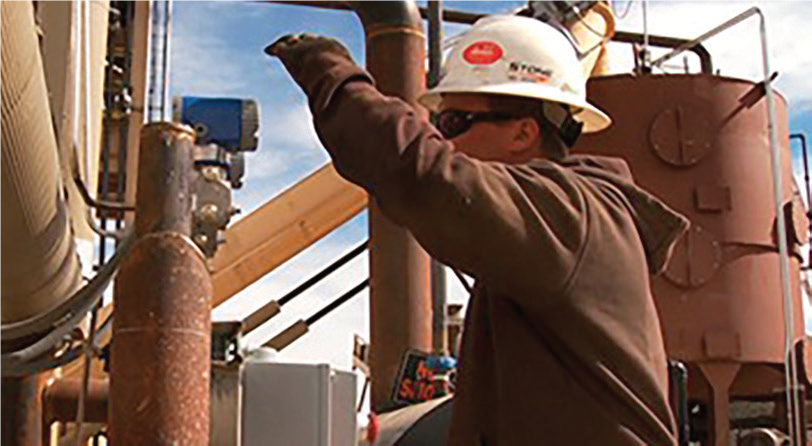Uintah Basin refining plant up and running with an extraction process owners say is clean and efficient
By John Rogers
 There are trillions and trillions of barrels of oil locked up in the Earth’s oil sands. Trouble is, the only way to access these massive petroleum deposits has been to apply the dirtiest and costliest processes imaginable. Recovery of salable product from oil sands and oil shale leaves an environmental nightmare of a mess and often costs in excess of $75 per barrel to do. With crude oil selling well below $75 per barrel, it just didn’t make sense.
There are trillions and trillions of barrels of oil locked up in the Earth’s oil sands. Trouble is, the only way to access these massive petroleum deposits has been to apply the dirtiest and costliest processes imaginable. Recovery of salable product from oil sands and oil shale leaves an environmental nightmare of a mess and often costs in excess of $75 per barrel to do. With crude oil selling well below $75 per barrel, it just didn’t make sense.
Until now.
{mprestriction ids="1,3"}A small Canadian company has begun production at its proprietary heavy oil processing and extraction plant at Asphalt Ridge near Vernal. The company has developed a breakthrough, closed-loop system that extracts clean oil from dry oil sands for as low as $28 a barrel in high volume settings — and it doesn’t leave a mess.
The company is Petroteq Energy Inc., with its head office in Toronto and its initial refining operation in Utah. Its proprietary processes for removing a semi-solid petroleum product called bitumen from the sandstone at the Vernal site transforms mined rock and sand into heavy oil that is then turned into diesel fuel, kerosene and jet fuel or mixed with lighter oils.
The industry website oilprice.com recently named Petroteq one of five oil companies to watch in 2018. The tiny company gets equal billing with industry giants such as Conoco Phillips, Valero and Halliburton as good places to invest in energy development. “The licensing opportunities for Petroteq are enormous,” oilprice.com said. “Companies across the globe are going to want to use the company’s tech to exploit oil sands deposits. All Petroteq has to do is sit back and watch the fees roll in.”
“As oil prices stay high and the market tightens, demand for Petroteq’s tech will only get stronger, particularly as bottlenecks hamper production increases in the Permian. The Utah oil sands could become the next Permian Basin (West Texas’ massive oil fields). And Petroteq will be at the forefront,” the website concluded.
An explanation of the traditional process of extracting oil from sand and shale shows the importance of Petroteq’s breakthrough process to the petroleum industry. It is important to understand what makes the traditional oil sands methodology so costly.
Oil sands are a combination of clay, sand, water and bitumen — a thick, heavy, black oil. To extract the oil, the sand itself must be mined, usually with open-pit or strip mine techniques. Once the oil “ore” is mined, it must be transported to an extraction plant for processing. At the plant, a hot-water process is used to separate the valuable bitumen from all the sand, rocks, clay and other minerals. Then, it moves on to separation cells, where hot water is pumped into the sand, forming a slurry that’s then piped into the extraction plant where the hot water/sand/bitumen mixture is agitated to release the bitumen from the sand. It takes about 2 tons of oil sands ore to generate one barrel of oil. Once processing is complete, all that now-toxic water is run off and gathered in tailing ponds, open pools of sludge that take decades to remediate.
The Canadian government estimates that the tailing ponds left over in Alberta from its massive oil sands projects have left pools of toxic waste holding over 1 trillion liters of sludge covering 220 square kilometers.
Petroteq’s Unitah Basin plant is up and going. It isn’t producing $28 per barrel oil yet, but the owners say it’s just a matter of time. The relatively tiny plant is expected to produce 1,000 barrels per day by the end of the year and Petroteq says the plant is easily expandable. After five years of research, two years of construction — and reconstruction — and testing, the company’s relatively paltry — by industry standards — $15 million investment is paying off and producing oil. Already the product is coming out at a fraction of the traditional cost of oil-sand petroleum.
Petroteq’a proprietary system is the game-changer the industry has been needing for a long time, said oilprice.com reporter Ian Jenkins. “It’s clean, it’s completely self-contained and it can extract 99 percent of all the hydrocarbons at costs as low as $28 per barrel … .”
According to Petroteq chairman and CEO David Sealock, “No other company has what we have in this space.”
Unlike traditional processes, Petroteq’s technology creates a continuous-flow, closed-loop system where oil sands go in one end and only oil and clean sands come out the other. The real innovation of this system — and what makes it a true breakthrough — is the use of specially formulated, non-toxic solvents to replace the thousands of gallons of water used in the traditional oil sands extraction processes.
Oil sands ore goes into the system, where it’s crushed into uniform chunks 3/4 of an inch in size. These small chunks are then moved to a vertical tank, where they’re mixed with the special solvents and spun furiously by three horizontal propellers. “It is like a cyclone,” said Ukrainian chemist Vladimir Podlipskiy, Petrotech’s chief technology officer, who was the main author of the process.
Most importantly, the consistent size of the crushed ore increases available surface area, allowing for a more complete extraction and less time in the mixing tank, thus speeding up the entire process, Podlipskiy explained. As the system moves on, remaining solids fall out of the mixture and the remaining liquids are run through a heated separation column. The heat causes the solvents to float off as vapor where they’re condensed back into liquids and recycled back through the process with fresh ore. Petroteq expects to recycle over 99 percent of the solvents used in the process, leaving no wastewater, no tailings ponds and no need for remediation
At the end, the black oil is piped out and the sands emerge completely dry, scrubbed almost entirely of hydrocarbons and solvents. The clean sand can immediately be returned to the mine pit, safely and without the need for further remediation to prevent chemicals leaching into the ground. The clean sand can also be sold as an aggregate for the construction industry.
An innovative “plug and play” system allows additional units to be added to the plant as they are manufactured. Petroteq hopes to double production from 1,000 to 2,000 barrels per day at the Vernal plant in 2019 and then more than double again, scaling up to 5,000 barrels a day by the end of 2020. With over 93 million barrels estimated to be available in the company’s current Uintah Basin leases, Petroteq could potentially produce 10,000 barrels a day for the next 25 years.
But that could be small potatoes.
There are oil sands in many countries, but it has been too expensive and dirty to extract. And all that oil — most of it unprofitable with traditional extraction methods — suddenly becomes hugely profitable with Petroteq’s $28-a-barrel technology. The U.S. Geological Survey estimated that Venezuela’s Oronoco oil sands could hold as much as 1 trillion barrels of oil in place, with 652 billion barrels considered accessible. Russia has an estimated 34 billion barrels locked up in oil sands. Kazakhstan is sitting on 42 billion barrels and China has 5.9 billion. Canada’s Athabaska field alone could possibly hold as much as 2 trillion barrels.
Industry experts think Petroteq’s technology could become the most in-demand oil field technology in the world and international licensing agreements could prove immensely profitable, according to oilprice.com.
And Petroteq has one more ace up its sleeve — blockchain technology, the digital open ledger systems pioneered by cryptocurrencies like Bitcoin. Petroteq is taking the lead by bringing a blockchain-based technology to the oil and gas industry. Called PetroBLOQ, the company’s innovation is a blockchain-based platform designed exclusively for the oil and gas industry. The company says it’s just the thing for dealing with fluctuating oil prices to insert market efficiency and cost-effectiveness at every stage of the petroleum supply chain — upstream, midstream and downstream — by making storage and management of large amounts of data more secure, strengthening the industry’s defense against cyberattacks.
“Oil and gas companies could derive many benefits from blockchain technology, from enhancing efficiency and transparency to more securely storing and managing data,” the Wall Street Journal said in a recent article. Petroteq has developed its own version and is preparing to put it to work.
Petroteq’s two big breakthroughs — clean oil sands processing and PetroBLOQ blockchain technology — have put the small Canadian company in a position to step up and prove it has the solutions to the industry’s biggest and most costly problems.{/mprestriction}








